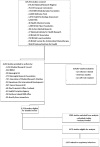Investments in respiratory infectious disease research 1997-2010: a systematic analysis of UK funding
- PMID: 24670431
- PMCID: PMC3975787
- DOI: 10.1136/bmjopen-2013-004600
Investments in respiratory infectious disease research 1997-2010: a systematic analysis of UK funding
Abstract
Objectives: Respiratory infections are responsible for a large global burden of disease. We assessed the public and philanthropic investments awarded to UK institutions for respiratory infectious disease research to identify areas of underinvestment. We aimed to identify projects and categorise them by pathogen, disease and position along the research and development value chain.
Setting: The UK.
Participants: Institutions that host and carry out infectious disease research.
Primary and secondary outcome measures: The total amount spent and number of studies with a focus on several different respiratory pathogens or diseases, and to correlate these against the global burden of disease; also the total amount spent and number of studies relating to the type of science, the predominant funder in each category and the mean and median award size.
Results: We identified 6165 infectious disease studies with a total investment of £2·6 billion. Respiratory research received £419 million (16.1%) across 1192 (19.3%) studies. The Wellcome Trust provided greatest investment (£135.2 million; 32.3%). Tuberculosis received £155 million (37.1%), influenza £80 million (19.1%) and pneumonia £27.8 million (6.6%). Despite high burden, there was relatively little investment in vaccine-preventable diseases including diphtheria (£0.1 million, 0.03%), measles (£5.0 million, 1.2%) and drug-resistant tuberculosis. There were 802 preclinical studies (67.3%) receiving £273 million (65.2%), while implementation research received £81 million (19.3%) across 274 studies (23%). There were comparatively few phase I-IV trials or product development studies. Global health research received £68.3 million (16.3%). Relative investment was strongly correlated with 2010 disease burden.
Conclusions: The UK predominantly funds preclinical science. Tuberculosis is the most studied respiratory disease. The high global burden of pneumonia-related disease warrants greater investment than it has historically received. Other priority areas include antimicrobial resistance (particularly within tuberculosis), economics and proactive investments for emerging infectious threats.
Keywords: financing; investments; policy; respiratory.
Figures




References
-
- Murray CJL, Vos T, Lozano R, et al. Disability-adjusted life years (DALYs) for 291 diseases and injuries in 21 regions, 1990–2010: a systematic analysis for the Global Burden of Disease Study 2010. Lancet 2012;380:2197–223 - PubMed
-
- Global tuberculosis report 2012 Geneva: World Health Organization, 2012. http://www.who.int/tb/publications/global_report/en/ (accessed 19 Aug 2013)
Publication types
MeSH terms
Grants and funding
LinkOut - more resources
Full Text Sources
Other Literature Sources
